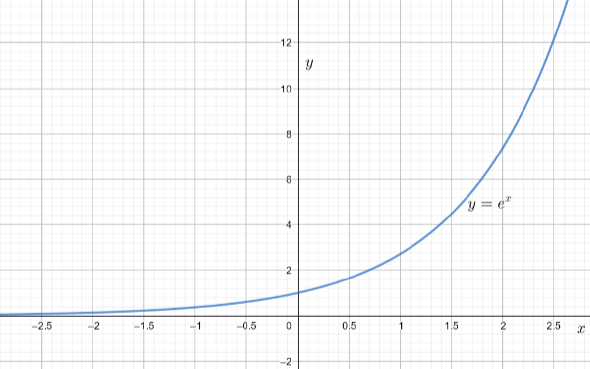
What is the limit as x approaches infinity of \[{{e}^{x}}\]?
Answer
518.4k+ views
Hint: In this type of question we have to use the concept of limit at infinity. We know that the idea of a limit is the basis of all calculus. Also we know that, a limit tells us the value that the given function approaches as that function’s input approaches to some number.
Complete step by step answer:
In the given question, we have to find the limit of \[{{e}^{x}}\] as \[x\] approaches to \[\infty \].
Hence, the function is \[f\left( x \right)={{e}^{x}}\] and limit as \[x\] approaches to \[\infty \] i.e. \[x \to \infty \]
\[\Rightarrow \displaystyle \lim_{x \to \infty }f\left( x \right)=\displaystyle \lim_{x \to \infty }{{e}^{x}}\]
By applying the value of \[x\] as \[\infty \], we can write,
\[\Rightarrow \displaystyle \lim_{x \to \infty }{{e}^{x}}={{e}^{\infty }}\]
As we know that, the domain of \[{{e}^{x}}\] is the whole of \[\mathbb{R}\] and the range is \[\left( 0,\infty \right)\]. Also \[{{e}^{x}}\] is continuous function defined on the whole of \[\mathbb{R}\] and infinitely differentiable, with \[\dfrac{d}{dx}{{e}^{x}}={{e}^{x}}\].
Hence, the value of \[{{e}^{\infty }}=\infty \]
\[\Rightarrow \displaystyle \lim_{x \to \infty }{{e}^{x}}=\infty \]
Thus, the limit as \[x\] approaches \[\infty \] of \[{{e}^{x}}\] is \[\infty \].
Note: In this type of question one of the students may state the result with the help of a graph also. The function \[f\left( x \right)={{e}^{x}}\] is an equation in which the variable is an exponent, and the graph is exponentially increasing with respect to \[x\]. Where, \[x\] is a real number and \[e\] is a positive constant. The graph for \[f\left( x \right)={{e}^{x}}\] is as follows:

From the above graph of \[{{e}^{x}}\] with respect to \[x\] we can clearly observe that as \[x\] approaches to \[\infty \], the function \[{{e}^{x}}\] also approaches to \[\infty \].
Thus, the limit as \[x\] approaches \[\infty \] of \[{{e}^{x}}\] is \[\infty \].
Complete step by step answer:
In the given question, we have to find the limit of \[{{e}^{x}}\] as \[x\] approaches to \[\infty \].
Hence, the function is \[f\left( x \right)={{e}^{x}}\] and limit as \[x\] approaches to \[\infty \] i.e. \[x \to \infty \]
\[\Rightarrow \displaystyle \lim_{x \to \infty }f\left( x \right)=\displaystyle \lim_{x \to \infty }{{e}^{x}}\]
By applying the value of \[x\] as \[\infty \], we can write,
\[\Rightarrow \displaystyle \lim_{x \to \infty }{{e}^{x}}={{e}^{\infty }}\]
As we know that, the domain of \[{{e}^{x}}\] is the whole of \[\mathbb{R}\] and the range is \[\left( 0,\infty \right)\]. Also \[{{e}^{x}}\] is continuous function defined on the whole of \[\mathbb{R}\] and infinitely differentiable, with \[\dfrac{d}{dx}{{e}^{x}}={{e}^{x}}\].
Hence, the value of \[{{e}^{\infty }}=\infty \]
\[\Rightarrow \displaystyle \lim_{x \to \infty }{{e}^{x}}=\infty \]
Thus, the limit as \[x\] approaches \[\infty \] of \[{{e}^{x}}\] is \[\infty \].
Note: In this type of question one of the students may state the result with the help of a graph also. The function \[f\left( x \right)={{e}^{x}}\] is an equation in which the variable is an exponent, and the graph is exponentially increasing with respect to \[x\]. Where, \[x\] is a real number and \[e\] is a positive constant. The graph for \[f\left( x \right)={{e}^{x}}\] is as follows:

From the above graph of \[{{e}^{x}}\] with respect to \[x\] we can clearly observe that as \[x\] approaches to \[\infty \], the function \[{{e}^{x}}\] also approaches to \[\infty \].
Thus, the limit as \[x\] approaches \[\infty \] of \[{{e}^{x}}\] is \[\infty \].
Recently Updated Pages
Master Class 11 Computer Science: Engaging Questions & Answers for Success

Master Class 11 Business Studies: Engaging Questions & Answers for Success

Master Class 11 Economics: Engaging Questions & Answers for Success

Master Class 11 English: Engaging Questions & Answers for Success

Master Class 11 Maths: Engaging Questions & Answers for Success

Master Class 11 Biology: Engaging Questions & Answers for Success

Trending doubts
One Metric ton is equal to kg A 10000 B 1000 C 100 class 11 physics CBSE

There are 720 permutations of the digits 1 2 3 4 5 class 11 maths CBSE

Discuss the various forms of bacteria class 11 biology CBSE

Draw a diagram of a plant cell and label at least eight class 11 biology CBSE

State the laws of reflection of light

Explain zero factorial class 11 maths CBSE




